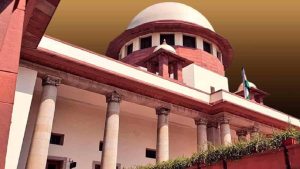
The Supreme Court on Friday said that it would treat and deal with all hate speeches alike, whether they came from one side or the other.
The oral observation was made by the Bench of Justice Sanjiv Khanna and Justice S.V.N. Bhatti on a batch of petitions seeking action against hate speeches, including a recently-filed plea seeking action against calls made by several groups for the social and economic boycott of Muslims following the Nuh-Gurugram communal violence in Haryana.
After a brief hearing, the Apex Court adjourned the matter till August 25, stating that the Division Bench had to hear a batch of pleas challenging the caste-based survey undertaken by the Bihar government.
Right at the outset, the Bench made it clear that it would not be able to hear this matter today and would take the same on Friday.
Justice Khanna said that he had gone through the Tehseen Poonawalla guidelines and hoped that they were being complied with.
A Counsel apprised the court about the provocative slogans raised by members of the youth wing of the Indian Union Muslim League during a July rally in northern Kerala, alleging that slogans such as ‘death to Hindus’ were raised during the rally.
The Bench assured him that the hate speech law would apply irrespective of the identity of the perpetrator, adding that anyone indulging in ‘hate speech’ would be dealt with as per the law.
Noting that the Apex Court has clearly expressed its opinion on hate speech, the Bench said the same need not be repeated.
Justice Khanna then instructed the counsel wishing to file their written submissions to submit them one day before the next date of hearing.
Earlier on August 11, the Supreme Court had mulled the formation of a committee led by the Director General of Police (DGP) to look into the cases registered after the communal clashes in Nuh.
The Bench of Justice Sanjiv Khanna and Justice S.V. Bhatti, while terming the calls to boycott the Muslim community after the recent outbreak of violence at Nuh district of Haryana as ‘unacceptable,’ suggested the Haryana DGP to constitute a committee of three-four officers nominated by him and peruse all material related to the incidents.
Noting that there has to be some harmony and comity between the communities, the Bench recommended the SHO concerned to forward all material to the committee and take a call on whether the material was authentic or not.
The Apex Court suggested the SHO to issue directions to the concerned officer. It also stressed on sensitisation of police officers, including at the SHO level. The top court of the country then listed the matter for further hearing on August 18.
The orders were passed on a petition filed by Shaheen Abdullah as an interlocutory application in a pending writ petition seeking action against certain groups, which were allegedly calling for a social and economic boycott of Muslims.
The plea mentioned a video that surfaced on social media on August 2, which showed members of the Samhast Hindu Samaj walking through a neighbourhood in Hisar, Haryana and allegedly issuing warnings to residents and shopkeepers that if they continued to employ or keep any Muslims, their shops would be boycotted.
Appearing for the petitioner, senior Advocate Kapil Sibal alleged that the incident took place in the presence of police officials.
The petitioner further mentioned the August 2 order of the Supreme Court, wherein it had directed the police authorities to ensure that no hate speech or violence took place during the various marches being held by the Vishwa Hindu Parishad and the Bajrang Dal in different parts of the Delhi-National Capital Region in protest against the recent incidents of communal violence in Nuh and Gurugram of Haryana.
The plea said despite the Apex Court order, more than 27 rallies have been organised across various states, wherein blatant hate speeches were delivered, calling for the killing, along with social and economic boycott of Muslims.
It further alleged that VHP leader Kapil Swami called for violence and boycott of Muslims in the presence of police officials in Sagar, Madhya Pradesh on August 4.
Referring to a speech made by a Bajrang Dal leader in Fazilka of Punjab on August 6, the petitioner said the leader, during his speech, justified the murders of Nasir and Junaid, who were brutally beaten and burnt alive in February, 2023.
The petitioner warned that such rallies, which ‘demonised’ the communities and openly called for violence and killing of people, were not limited in terms of their impact to just those areas presently dealing with communal tensions, but would inevitably lead to communal disharmony and violence of an unfathomable scale across the country.
The plea sought action against police officers who participated in those rallies & meetings and failed to prevent hate speeches, apart from directions to the concerned State police to explain the action taken by them against hate speeches.
Additional Solicitor General K.M. Nataraj, representing the Central government, said the government did not support hate speech. However, in some places, the mechanism to tackle the hate speech was not working, he added.
(Case title: Shaheen Abdullah vs Union of India & Ors)
The post appeared first on .
